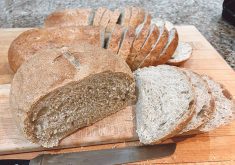Farmers who want to vote in Canadian Wheat Board (CWB) elections will have had to produce 40 tonnes of grain in the current or previous two crop years if Bill C-27 becomes law.
The Canadian Wheat Board Payments and Election Reform Act introduced in the House of Commons last week also promises to process CWB requests for higher initial and adjustment payments faster.
Currently CWB permit book holders and so-called “interested parties” named in permit books automatically get ballots to vote in CWB elections held every two years alternating between odd-and even-numbered districts. (There’s an election this fall in the five odd-numbered districts.)
Read Also

Mazergroup’s Bob Mazer dies
Mazergroup’s Bob Mazer, who helped grow his family’s company into a string of farm equipment dealerships and the main dealer for New Holland machinery in Saskatchewan and Manitoba, died July 6 from cancer.
Interested parties include crop-share landlords and mortgage holders.
Grain producers who don’t have permit books can apply for a vote if they can demonstrate they produced grain in the current or previous two crop years.
Crop-share landlords will still be eligible to vote if their share is at least 40 tonnes.
“This bill (C-27) will clarify that hobby farmers, retired farmers and farmers who haven’t produced significant amounts of grain in recent years should not be deciding who directs the Canadian Wheat Board,” Agriculture Minister Gerry Ritz told reporters. “This bill is something farmers are calling for and the Canadian Wheat Board itself supports.”
PACKAGE DEAL
CWB chair Larry Hill said the CWB generally supports the 2005 CWB election review
“What the minister is doing here is analogous to excluding some smaller cattle farmers from voting in cattle association ballots, but allowing hog farmers to vote.”
– TERRY BOEHM
panel’s recommendations as a package. One of its recommendations is farmers should have to deliver (not just produce) at least 40 tonnes of grain to the CWB to get a ballot. (Grain is defined as at least one of the following: wheat, oats, barley, rye, flaxseed, rapeseed or canola.)
The review panel recommended 13 other changes, including establ ishing an autonomous election commission to replace the Election Co-ordinator hired to oversee elections.
In the last election two years ago, the Election Co-ordinator said it wasn’t his job to decide who should register as a third party. And some third parties never reported their spending to the Election Co-ordinator, even though that’s required under the law.
The CWB has a list of its own recommendations, including clarifying the powers of the Election Co-ordinator. Ritz said additional changes to CWB election rules will be made through regulation, but didn’t elaborate.
He also said the government will not try to remove the CWB’s single-desk marketing powers before this fall’s CWB election.
GROW
C-27 proposes farmers would have to grow 40 tonnes of grain to get a vote, but not necessarily have to deliver any of it to the CWB. And there’s the rub, according to the Friends of the Canadian Wheat Board (FCWB) and National Farmers Union (NFU). They say only farmers who deliver grain to the CWB and pay for its operation, should get a vote.
“In elections for canola, pulse crop, or flax organizations, only the farmers who grow those crops get a ballot,” NFU president Terry Boehm said in a news release. “What the minister is doing here is analogous to excluding some smaller cattle farmers from voting in cattle association ballots, but allowing hog farmers to vote.”
The FCWB says the 40-tonne threshold will disenfranchise legitimate voters.
The NFU and FCWB suspect proposed changes in voter eligibility is another government attempt to stack the deck in favour of ant i -single-desk candidates.
Now eight of the 10 elected directors support the single desk. The election of one more open-market director would tip the balance smoothing the government’s way to achieving its promise of an open market for wheat and barley.
POWER BALANCE
Asked what impact C-27 would have on this fall’s election Ritz said: “We’re hoping more and more farmers will take part in the democratic process. That’s what they tell us that they want to see – some significant changes in governance. We’re hopeful in having the voice of the farmers who are actually producing grain a little louder, a little stronger in this next election (and it) will make a difference.”
The Grain Growers of Canada (GGC) supports C-27.
President Doug Robertson said the GGC hasn’t pushed for the review panel’s other recommendat ions hoping C-27’s narrow focus will meet with opposition approval, ensuring passage before Parliament breaks for summer in late June.
But Liberal Agriculture critic Wayne Easter said given the government’s past underhanded attempts to undermine the CWB it can’t be trusted.
“The bill is going to require very serious scrutiny,” he said. “The minister seems to want to put it through the house fairly rapidly. But this is the same crew that prorogued Parliament.”
Ritz said he can’t see anyone blocking legislation to get money to farmers faster.
Before the CWB can increase its initial payments to farmers, the request must be assessed and approved by the departments of Agriculture, Finance and the Treasury Board and be approved by cabinet. That typically takes six to eight weeks, but sometimes longer.
C-27 proposes bypassing the Treasury Board and cabinet, cutting the process time in half, Ritz said. [email protected]



















